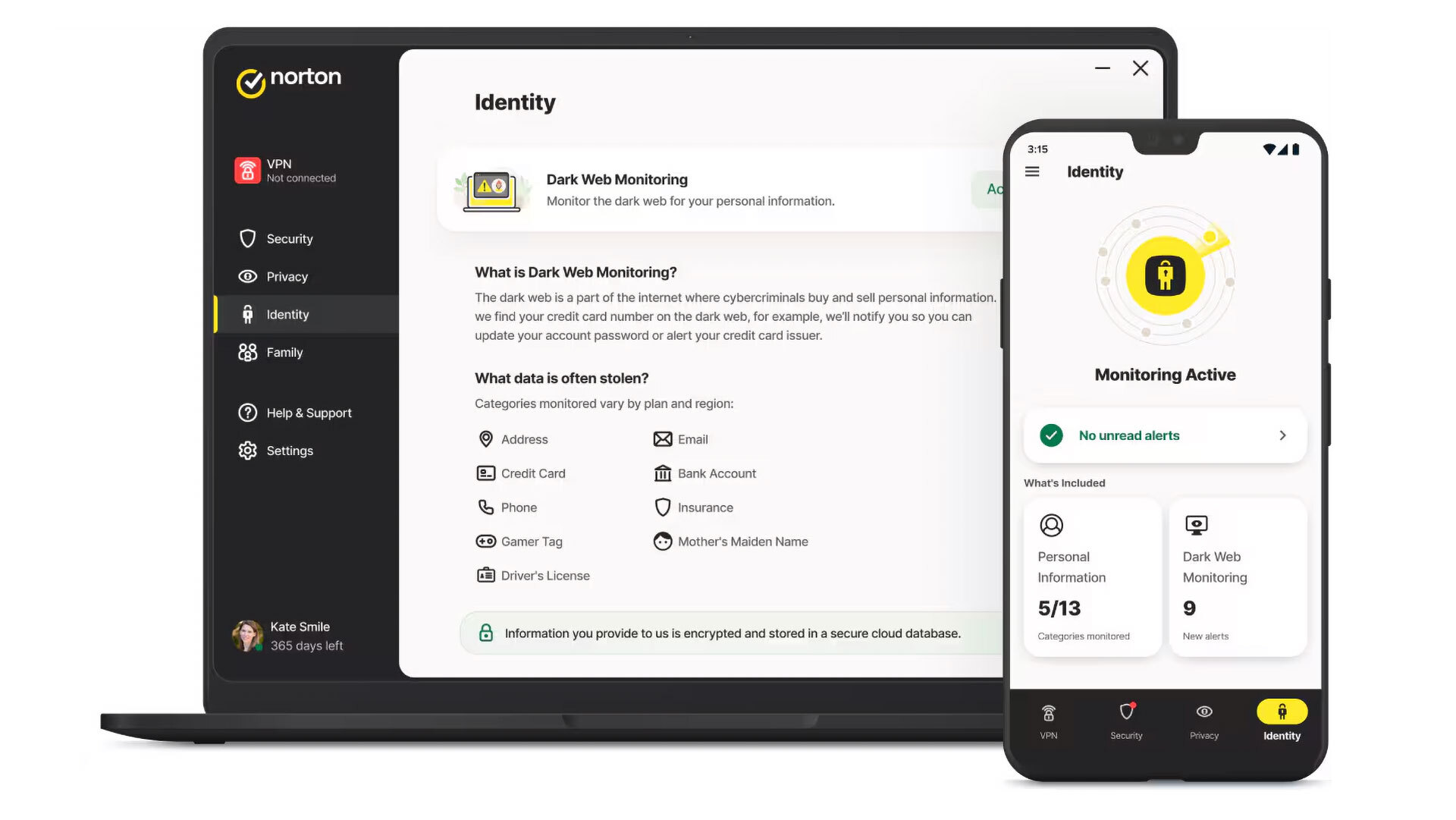Hackers are levelling-up identity theft attacks with AI – here's what you need to look out for
It's never been more important to crank up your online security

It’s never been more important to protect your identity online. The rise of AI has led to increasingly sophisticated attacks which can intelligently locate all manner of details about you, including leaked passwords, contact details and online accounts, meaning the bad guys barely have to try any more.
The consequences of identity theft are also becoming increasingly serious. Almost everything we do, including banking, investing, messaging, storing media and even authentication is done online, meaning a breach can lead to all manner of consequences, including financial loss, reputational damage, legal trouble, years of remediation processes and exposure of private data that you wouldn’t want exposed.

Everyone is at risk
The issues escalate quickly when kids are involved, too. Many young people possess online street smarts, but they don’t often get lectured about online security like they do with stranger danger. Cybercriminals know, all too well, that plenty of young people’s online-game accounts are laden with valuable game-related l00t and that they’re potentially very soft targets who are more-likely to swap important credentials on the promise of free in-game currency and other temptations.
So, how can you help prevent this happening to you and yours and what are your options if you fall victim?
Many people reading this will likely deal with an online service that still asks security questions like your mother’s maiden name, birthplace and pets’ name etc. This is farcically easy to find, not only from your own social media profiles, but from those of friends and family. Add AI to the mix and it’s never been easier to generate a personal profile of someone’s entire life.
Escalating threats
Then there are deepfakes. Basic social media filters illustrate just how easy it is to wear someone else’s face online, and it’s even possible to copy your voice based on a few words said in a video. The most secure consumer platforms require a combination password, trusted device authentication, two-factor authentication (2FA – usually via SMS or email), authenticator app passcodes and even live facial recognition because each of these can now be hacked on their own. But, how many online entities do you deal with that perform all of these checks, at once?
And the scams are multiplying exponentially. Just this month, a North Asian country was exposed as being behind a sophisticated scam that captures personal details and delivers malware through online job ads. Other serious AI-based threats have recently come from Fake Netflix communications; Malware-infected cracks for popular online games, fake Google ads that steal Google passwords and 2FA credentials; fake Nvidia graphics card security alerts; nefarious YouTube tools; Gmail account-recovery hacks (that affected 2.5 billion users); and even car park hacks where payment was requested via a QR code. It's worth noting that most of these examples have come to light in just the past few weeks! That’s all on top of years’ worth of tried and tested identity theft tactics (like dumpster diving, mail theft and malicious address changing) plus, scams we don’t even know about yet. Even classic, noughties, fake antivirus scams are making a comeback. You need to protect yourself, or this might happen...

How bad can it be?
Aussie mum Sarah Luke was affected when her PayPal account was hacked. The hackers then used her account to sell over $1million of fake sporting goods. She was promptly sued by both Adidas and the NBA in America and was fined $1.8m in a default judgment. So, what is one to do?
Prevention is the priority. It’s still important to have anti-malware protection on your PC or Mac and, where possible, your mobile devices too. These will pick-up standard and evolving threats and use AI to fight AI. Secure data backups and password managers are critically important. These don’t just facilitate using complex, unguessable passwords, they usually check whether your credentials have been leaked online. Check for yourself at haveibeenpwned.com. Using a VPN to browse the web more securely and privately is also essential.

Protect yourself, now
Here, it’s worth mentioning Norton 360 Advanced . It not only offers real-time malware protection, cloud backup for Windows PC, a password manager, and a VPN but also Parental Controls to help keep children safer and focused when online. It also continually monitors the Dark Web to see whether your personal information has been exposed.
Its Virus Protection Promise means if your device gets infected by a virus, you can contact their virus removal service. A Norton expert will work remotely to help remove the virus, and if they can’t, you’ll be entitled to a refund.¹ Other services include automated monitoring of your financial transactions and popular social media sites to alert you of suspicious activities; stolen wallet assistance to guide you on how to cancel or replace credit cards, drivers’ license, and other documents in the event of a stolen wallet; and identity theft insurance that offers coverage for specific losses and expenses related to identity theft in your name, including legal expense reimbursement, and loss of income for time away from work to correct financial records.²
If you do become a victim of identity theft, a Norton Identity Restoration Specialist will help you restore your identity, by guiding you through the process from start to finish. It spent 70 hours helping Sarah Luke get her life back.
In this day and age, few people can afford to be without automated protection, so it’s well worth letting Norton take the burden from you.

¹ Virus Protection Promise: Restrictions apply. Must have an automatically renewing device security subscription with antivirus for the virus removal service. See Norton.com/virus-protection-promise for complete details.
² Terms, conditions, exclusions and limitations apply. See the Identity Theft Insurance Australia Policy Information Booklet found on https://www.nortonlifelock.com/au/en/legal/ for details. Coverage provided by AIG Australia Limited AFSL 381686 (AIG). NortonLifeLock Australia Pty Ltd (Norton) acts as a group purchasing body in acquiring and arranging the insurance coverage under a group policy issued by AIG to Norton. Norton does not hold an Australian financial services licence. Please obtain your own financial product advice about our services and consider the policy information booklet to determine if the coverage is right for you.
The TechRadar hive mind. The Megazord. The Voltron. When our powers combine, we become 'TECHRADAR STAFF'. You'll usually see this author name when the entire team has collaborated on a project or an article, whether that's a run-down ranking of our favorite Marvel films, or a round-up of all the coolest things we've collectively seen at annual tech shows like CES and MWC. We are one.
